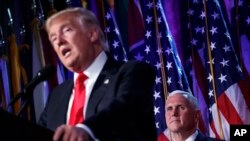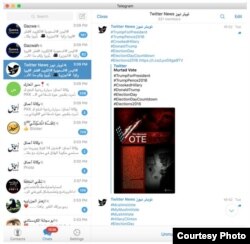It did not take long for some of the world's most notorious terror groups to start celebrating Donald Trump's win in the U.S. presidential election, trying to leverage it on social media to attract more fighters to their causes.
There is little consensus, however, as to whether the Republican candidate's victory, combined with his campaign rhetoric, will serve to give the likes of al-Qaida and Islamic State anything more than a brief boost.
"#Trump's term may be the beginning of America's fragmentation," Abu Muhammad al-Maqdisi, a well-known and influential Jordanian cleric with ties to al-Qaida, bragged on Twitter hours after Trump claimed victory.
"#Trump exposes the real mentality of Americans, their racism toward Muslims and Arabs and everything," Maqdisi tweeted to his more than 56,000 followers. "He only shows what his predecessors were hiding. His victory exposes America and its sins even more so."
"The gloves are off … the Mujahideen are ready," tweeted another group, using the handle @GreenBirdMedia1.
The reaction from jihadists on other social media platforms, including the Telegram app favored by IS, was much the same.
"It seems to be pretty overwhelmingly positive," said former CIA analyst Aki Peritz, now with George Washington University's Center for Cyber and Homeland Security.
"Nobody's saying this is a terrible thing," he added. "They all support Donald Trump's win in their own way."
Analysts: Clinton win meant fodder, too
Yet while some of Trump's own words from the campaign trail may be giving terror groups extra fodder, Peritz and others in the intelligence community doubt their desire to attack the U.S. would have been any less had Democratic candidate and former Secretary of State Hillary Clinton emerged as the winner.
"The popular notion that Islamic State propagandists can use Donald Trump's victory to build support, more so than if Hillary Clinton won, is ridiculous," said Michael Smith of Kronos Advisory, a private intelligence group. "The election of a female president would be very quickly used by propagandists in all salafi-jihadist groups."
Smith said there also is ample evidence from jihadist groups themselves that they see little difference between the two candidates.
"The only differences between Trump and Clinton are that Clinton is more skilled in 'political correctness,' " the Islamic State said in a flyer disseminated by the group's al-Hayat Media Center in the days leading up to the U.S. election.
In addition, there is some sense the propaganda currently coming from IS, al-Qaida and other jihadists is bluster, meant to cover up fears that the targets on their backs actually may be growing.
"If anyone thinks that somehow al-Qaida and ISIS and these other groups are happy that Trump is president because he'll be less effective … that's just not true," said Michael Pregent, a former U.S. intelligence officer now with the Hudson Institute. "If I was an ISIS guy or an al-Qaida leader, I'd be more worried about a Trump administration."
ISIS is an acronym for Islamic State.
Trump stance may pay off
In particular, Pregent said, Trump's promise to take a tougher stance with Iran — and even rip up the Iranian nuclear deal — could pay off. He said changing direction with Tehran could make it more difficult for IS and al-Qaida, both Sunni Muslim groups, to use what has been a perceived U.S. tilt toward Iran, a Shi'ite Muslim power, to drive recruitment.
Pregent also feels Trump is likely to loosen restrictions that have hampered intelligence efforts to take down terror cells and key leaders.
"It will simply be accelerated," he said. "It will be done more often. It will be empowered to succeed."
Not everyone is convinced.
Former Assistant Secretary of State for Public Affairs P.J. Crowley said terror groups as resilient as al-Qaida and IS may be poised to take advantage of a Trump foreign policy "much more focused on American interests, probably a little less focused on American values."
"We're not necessarily going to worry about the character of our allies," Crowley told VOA's Press Conference USA on Wednesday. "We're going to worry about what they can do to solve a problem."
Al-Qaida in particular "has increasingly pivoted to localism, positioning itself as a partner/protector of oppressed Sunnis," Charles Lister, a senior fellow at the Middle East Institute, warned on Twitter, calling the prospects "deeply dangerous."
"If a Trump foreign policy prioritizes 'strongmen' allies, al-Qaida will get an unimaginable boost," he cautioned.






